Ellen and Jim Have a Blog, Too
We are two part-time academics. Ellen teaches in the English department and Jim in the IT program at George Mason University.


Diary entry: Foremother poets, reviews & movies; Thompson, Blaine, Freilicher & books (e.g., Paul Scott); struggling for a reading plan · 27 October 08
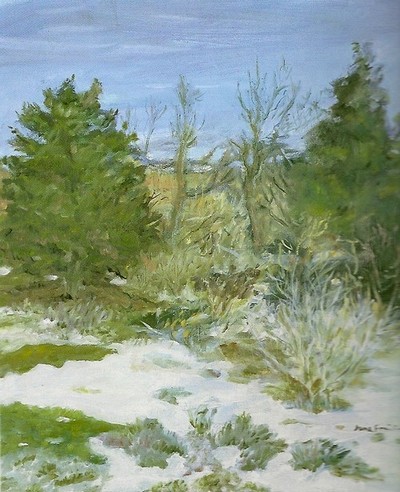
Jane Freilicher (b. 1924- ), Study for Winter (1977)
Dear Friends,
I’ve been having trouble making my mind work at night for the last couple of weeks. During the day I am enjoying the work (reading and writing up lectures) involved in teaching Advanced Comp on the Humanities, both classes are going well, & I just love getting home before noon on the two days I go in; nevertheless, getting up at 5:30 am in the pitch-dark, dressing, eating, feeding & caring for two cats, driving to GMU (all inside 2 hours), to arrive at my first classroom at GMU (on the other side of the campus from where I park) by 7:30 am, & proceeding to teach, drains me. I can scarcely stay up behind the wheel the two days I’m driving back.
I find I wake at this light-forsaken time several days a week, and my brains give out so I can’t read at night, can’t blog, can hardly focus my mind enough to watch a good movie. I can’t go to sleep for the night too early, for then I wake at 2 am and cannot get back to sleep. I can nap for an hour but then must somehow stay up until 12 or 1 in order to manage my 4-5 hour sleep (the most I usually sleep at a time).
I can resort to the Net: I can read emails, post to friends & lists, read blogs (I joined a movie community and read an excellent essay on Paul Newman), comment on these and even be somewhat awake and enjoy myself doing this. The screen seems to help, my own casual writing and the sense I’m with other people, reaching them and being reached. But no more, and even then I have gotten myself in trouble from things I’ve written in this state & sent to the wrong place. Ouch.
Laurel has declared herself too tired to keep up the Oxford reviews and her gothic November, so I will be writing one last review, of the latest Oxford Persuasion by myself. As a consequence I’ll keep it shorter, be more direct about which editions I recommend, briefer on the 4 movies, and bring the series to an end.
I’ll put writing about Radcliffe’s Udolpho off for at least a while. I had begun rereading it for a 4th time. It’s a puzzling extravaganza of shattered neurosis set in an in-depth startlingly beautiful cinematographic landscape. Perhaps that’s another aspect of her genius that’s not been mentioned: how she is the first of so many women to give us meditative self-recognizing luminous land- and seascapes.
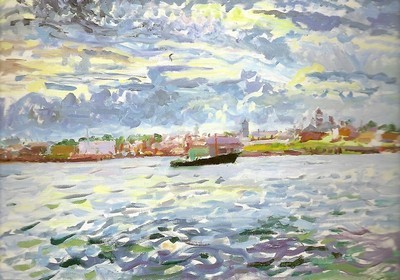
Nell Blaine (1922-96), Harbor Clouds
Blogging has been beyond me. Happily, last night & the one before for the first time in 2 weeks I’ve been able to read: my faithful companion, Trollope, whose books remain for me enormously readable, entertaining, relevant, still instructive and relevant: I’m into Chapter 10 of The Prime Minister.
And tonight I find I can write a blog. How to use this energy? First, I want to record a couple of publications, say a few words about those movies and books I have managed to see and/or read since last I described or listed any, and then work out a plan for the coming months which I can resolve to hold to.
I added another 6 women to the Wompo Festival site, all basically 19th century poets: Amelia Opie, Elizabeth Laetitia Landon, Frances Brown[e] (a blind poet), Augusta Davies Webster, and Charlotte Mew, Adela Florence Cory; this brings the number on the site to 34. I will choose but one of the last 6 and make a foremother poet blog for her next week.
My review of Judith Jennings’s book on Mary Morris Knowles, the radical quaker embroidery artist, Gender, Religion, and Radicalism in the Long Eighteenth Century: The ‘Ingenious Quaker’ and Her Connections has been published in the Intelligencer so I put it on my website, with a long footnote about Samuel Johnson. In the note I wonder how Johnson would have described a supposed fierce argument he had with Knowles over her helping an unfortunate young black woman to escape her relatives’ probably oppressive control: this was made a great fuss of by Knowles herself, Boswell, and Anna Seward. It takes up at least 2/3s of Jennings’s book. Did he even remember it? The brief note he has in a letter about Knowles shows no memory of the incident whatsoever.
Since last blogging about movies and books, I’ve finished (for these TV movies I mention only the screenplay writers), David Nokes & Janet Barron’s The Tenant of Wildfell Hall, watched all four episodes of the Australian mini-series, Guy Andrews’s Lost in Austen. I also rewatched Gwyneth Hughes’s & Anne Pivecvic’s Miss Austen Regrets; Mira Nair’s Namesake (after finishing listening to a moving reading by Sarita Choudhury), and Jenny Lumet and Jonathan Demme’s Rachel Getting Married. On all this I hope to write a separate blog in two days on Tenant and Namesake and two days after that Miss Austen Regrets and Lost in Austen.
********************
Books: I’m almost finished with an unusually candid intelligent biography of a living actress, Chris Nickson’s Emma: The Many Faces of Emma Thompson. The most interesting fact about Thompson’s life is that she did not train as an actress in a prestigous acting academy but rather rose gradually, transforming herself from a (failed) attempt at a career in popular TV and theater as a comedian to a (very successful) career as a nuanced, moving serious actress in movies.
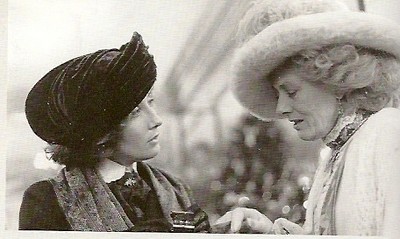
(Helen Schlegel [Emma Thompson] and Vanessa Redgrave [Ruth Wilcox], Howards End, from Nickson’s Emma)
I’ve read and spent hours gazing at the beautiful reproductions in two books on living women artists: Martica Sawin’s Nell Blaine and Klaus Kertess’s Jane Freilicher. So I interperse this blog with images from Sawin’s and Kertess’s books; of their oeuvres as represented in these books: they (as are so many women painters) both marvellous colorists:
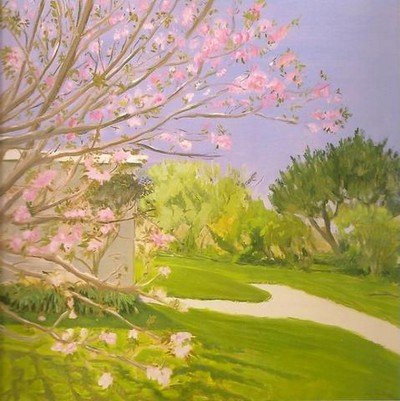
Jane Freilicher, Edge of Garden, Out of Doors.
They produce moving landscapes; their art reminds me of what Deborah Cherry says in her book of 19th century women painters. Blaine & Freilicher did not paint abstract impressionism, nor surreal, nor quite a number of movements famous in the 2nd half of the century & known mostly through paintings by men. Like the women of the 19th century, these women created a different subject matter conveyed by a] style appropriate to their vision and life as women.
Blaine’s line drawings remind me of Georgia O’Keefe’s in the way they figure women’s bodies out of natural shapes; Blaine loves quiet prosaic scenes at home.
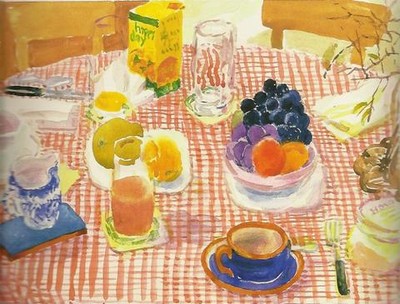
Nell Blaine, Evening Table
Freilicher looks at the world through windows, and often recreates 18th century genres (the conversation piece, as in Backgammon, the beautiful house in the landscape), even to the extent of imitating Watteau’s Le Mezzetin and placing him in a Serenade to a luminous rendition of Manhattan (seen from a roof).
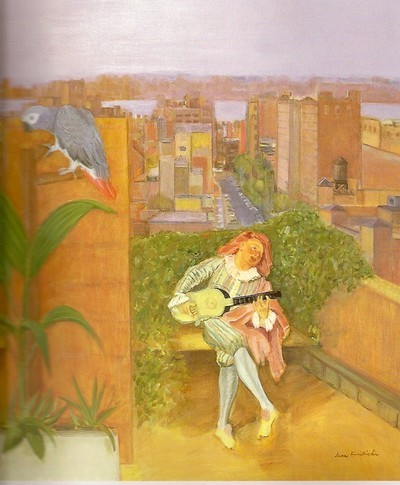
Jane Freilicher, Serenade (1993)
I have begun again listening to the unabridged The Jewel in the Crown read aloud on cassettes: I’m up to an unabridged text of the third novel, The Towers of Silence. I began listening in order to compare the brilliant film adaptation by Ken Taylor (who wrote the 1983 MP) with Paul Scott’s book, but have become deeply engaged by the brilliance and depth of Scott’s political and psychological-social vision of life itself. To speak just of this volume:
As a measure of the difference even between the apparently faithful film, and its book-source: most people who watched The Jewel in the Crown films, remember the brilliant performance of Peggy Ashcroft as Barbie Batchelor, partly because the role is central to the story from Part 2 on. In the four novels of The Jewel in the Crown, we first hear of Barbie Batchelor towards the end of Volume 2, and then only tangentially as the woman Martha Layton had living with her, a woman kind of to her grand daughters. She first emerges as a full-blown personality thematized importantly for the book at the opening of Volume III, Towers of Silence. Ken Taylor has taken a character from Book 3 who is major and restructured the narrative to make her major dramatically.
One of the extraordinary things about these books is how many of the narratives are by old women, and single ones at that. Edwina Crane opens Book 1, Lili Chatterjee takes a large part of the narrative of Book 2, Daphne Manners ends Book 2 (letters) and Sarah Layton (no boyfriend in sight, a woman who lives apart because of her real sensitivity, ethical nature, and high intelligence) much of Book 2. This is not lost in the mini-series as the women are strong dominating presences over the space of the dramatic scenes even if Hari Kumar and Ronald Merrick are given agency roles. Probably one of the reasons Scott is not treated as the major voice in post-colonial literature is his emphasis on elderly single women. The world as seen from a woman at home’s eyes (as in Blaine’s contemporary painting):
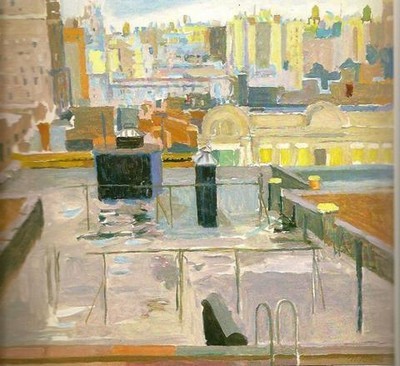
Nell Blaine, Rooftops 1
Again we are going over the same small group of events: the
rape of Daphne Manners, the assault on Edwina Crane and murder of her male Indian companion-teacher (whose name I can’t spell and can’t find just now in the book). The general perspective is Barbie Batchelor—who would know something of this, but we leave her mind when we need to as this indirect free discourse allowing our narrator to roam. Now this time we are looking at this event from the perspective of the English women (mostly officer and adminstrator’s wives and daughters and sisters) and the upper class Indian officers’ wives, and we get an array of brilliant pen portraits, particularly that of Mildred Layton who is now an alcoholic, a mean woman, narrow but given real sympathy here too, without ever sentimentalizing what she is.
The closest we come to Trollope today is in Paul Scott, and Scott has a larger more humane egalitarian perspective. He removes circularly through his material again and again, a
characteristic very like women’s novels. He has now introduced the Smalleys (the name recalls Dickens’s uses of semi-allegorical names) and set up the situation we will meet 10 years later in Staying On.
I’ve been plugging away at a book of essays on Ang Lee by Whitney Crothers Dilley, & attempting to keep my temper over the complete lack of any citation of any women writer or film-maker in Geoffrey Wagner’s Novel and Cinema since he makes such clear discriminations about what he sees and talks so usefully out of his careful observations and insights into films. I’ve also reread Sense and Sensibility once again.
You see I do not give up, even if the writing of the first chapter of my dreamt-of book, The Austen Films will not begin until this coming summer, and not even then if my proposal for JASNA is accepted. However, if it is, I’m not giving up, just putting it back. I am trying to resolve not to teach this summer. The interaction is so precious to me, and I really appreciate reaching the good students who appreciate what I do. I enjoy my young friend visitors and their emails. Still I know summer is often a course taken by students looking for a shortcut and that’s not what my courses are about.
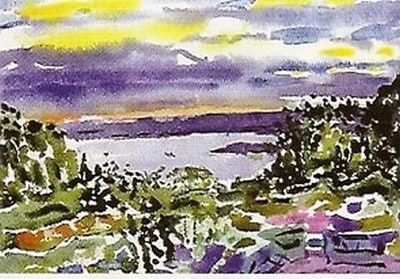
Nell Blaine, Layered Clouds and Shore (1982)
********************
I have, though, resolved that I can no longer depend on my ability to read or study or watch movies and take notes at night. We have coming up on my 3 yahoo lists some wonderful books and projects. On Eighteenth Century Worlds we are to read Vigee-LeBrun’s Memoirs and Charlotte Smith’s epistolary novel, Desmond (the first English novel to depict the early phase of the French revolution, and sympathetically too). I so enjoyed the memoirs of Elizabeth Grant Smith two years ago now (the Highland Lady), loved all the letters of French women of this era (but especially Julie de Lespinasse and Marie du Deffand), I must not miss on out on these two. I’ve had my proposal for a paper on the film, Clarissa accepted so I have to start rereading that book in December. (Also I am to receive $700 in travel allowance!) On Women Writers we are to read by women a series of 20th century plays, and then turn back to read a series by 17th through 18th century plays, plus some recent screenplays. I want to know and understand the last set (the Enlightenment women’s plays).
And on Trollope-l, accompany Trollope’s Palliser novels with George Meredith’s political novel, Beauchamp’s Career. Here I could learn something real of the politics of the period by seeing how Meredith sheds light on Trollope (Dickens is never direct about politics, and seems to avoid real reflection of political maneuvring—his target audience might not have understood or trusted him if he had).
So I do want to do all this, but how?
Well I have to set a day aside each week to read for the listservs. I think I’ll pick Friday this term (as my teaching is on Tues/Thurs), and keep to it. Later this week I’ll make a schedule for Vigee-LeBrun and Smith and next week for the plays. I’ve decided I will probably have to put the Austen project down for the time it takes to read say the first two volumes of Clarissa, and recent criticism of the book, and that I’ll do in early December. It will get me into the project and then I can join in with the people on ECW for the year following the calendar in January. I’ll alternate if I can and pick up the Austen project for a while in January and then write said paper in February. And then in March (after the paper is given) I’ll join the others in reading the book according to its own calendar once again.
Clarissa the book means a lot to me. Diana said to me: “I only read women authors (basically).” I love womens’ books too and have always preferred them. I can read male novelists and writers but they are of a particular type or frame of mind: Henry James, Trollope, Paul Scott, Diderot; recently I discovered I like Orphan Pamuk. Richardson is one of these; in fact, his woman epistolary writer in drag helped give rise to just the type of womans’ book I like (for I do not like all of them by any means), and I’m always looking for more as popular descriptions of books are so misleading.
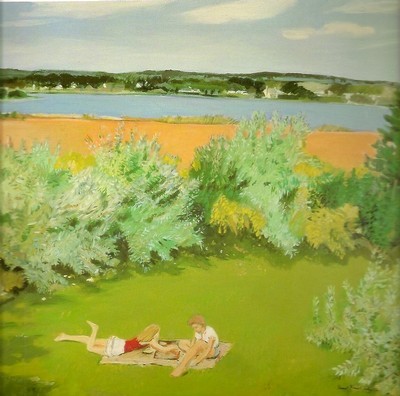
Jane Freilicher, Backgammon (1982)
This kind of schedule will I hope enable me to plod along on the Palliser films at the very slow rate I’ve been going. I will not give them up :) I mean eventually to write a paper on the Palliser films and send it to some Victorian journal.
So there’s where I am.
Ellen who will be back again in two days & nights from now—with a review of Tenant of Wildfell Hall and Namesake, the film: “Two Bronte narratives” will be my perspective on them.
--
Posted by: Ellen
* * *
Comment
- From Richard on ECW:
“I enjoyed very much your review and the note about Johnson. Totally
absorbing. And of course puzzling.—Richard”
— Elinor Oct 27, 10:11pm # - An interesting post in so many ways. I, too, am struggling with how to best manage my energy/attention across the arc of a day. But I want to respond to your note about Paul Scott. He’s one of my all-time favorite authors. Yes, I agree Jewel in the Crown is a masterpiece, but suggest you try some of his other novels, such as The Birds of Paradise, and his books of essays, On Writing and the Novel.
— Barbara Oct 29, 11:26am # - Update: Thank you so much, Barbara. I have bought myself a copy of On Writing and the Novel. I found one cheap here in the US; most of Scott’s non-Jewel novels are not available in the US and come at prices of $25 and up.
I have now torn up the schedule I was to fill out for summer courses. At first I filled it out, unable to face a summer with no regular social outlet. But then when I thought of the difficulties of doing a real course with students who have deliberately chosen a time frame that’s recalitrant, and foresaw the trouble of picking books, having to read and work at them, and how my proposal at JASNA might be accepted, my spirit knew that would preclude working on a book. And for what? Two students per class appreciating it. The Admiral says we don’t need the money. I must not romance the experience. I'd have to cope with high heat at 3 or exhaustion at 6 driving there too. No small thing for me.
So now after I write up my three blogs on Pallisers 8:16 (all the while reading criticism of Sense and Sensibility, the movie and watching them again, I’m going to work on my Persuasion blog and then see where I am, and then plug along at a rate I can manage—keeping up the Pallisers too while working on Clarissa and one day a week read for listservs.
When May comes, I’ll be ready and I hope able to plunge in, proposal accepted by JASNA or not. That is, over the summer I'll work on my book and interpersed this with the paper, which like the others I'll have done I shall not overwork on. E.M.
— Elinor Oct 29, 3:02pm # - 10/31/08: I added the last three I’ll do to the foremother poets on the Wompo Festival website: Vita Sackville-West, Dorothy Parker, and Ingeborg Bachmann. That brings the number on the festival website and at the wompo site to 37.
Determined, dared, and done. I will do no more for some time to come.
E.M.
— Elinor Oct 31, 9:23am # - Nick wrote on ECW on my review of the book on Knowles:
“Many thanks for this Ellen – fascinating.”
I took the opportunity to reply:
“Yes, Nick, and think about how we writing about Johnson assume the incident between the three accounts clearly and fairly characterized in its basics, and thus assume that Johnson would have retained a if not an actively hostile at least wary and guarded attitude towards Knowles. But from the one note by him, no, not at all. Had he written down what happened, what would he have have said of the psychological and behaviors and motives of Seward, Boswell, Knowles, and the others standing round?
E.M.
— Elinor Nov 3, 9:44am #
commenting closed for this article
